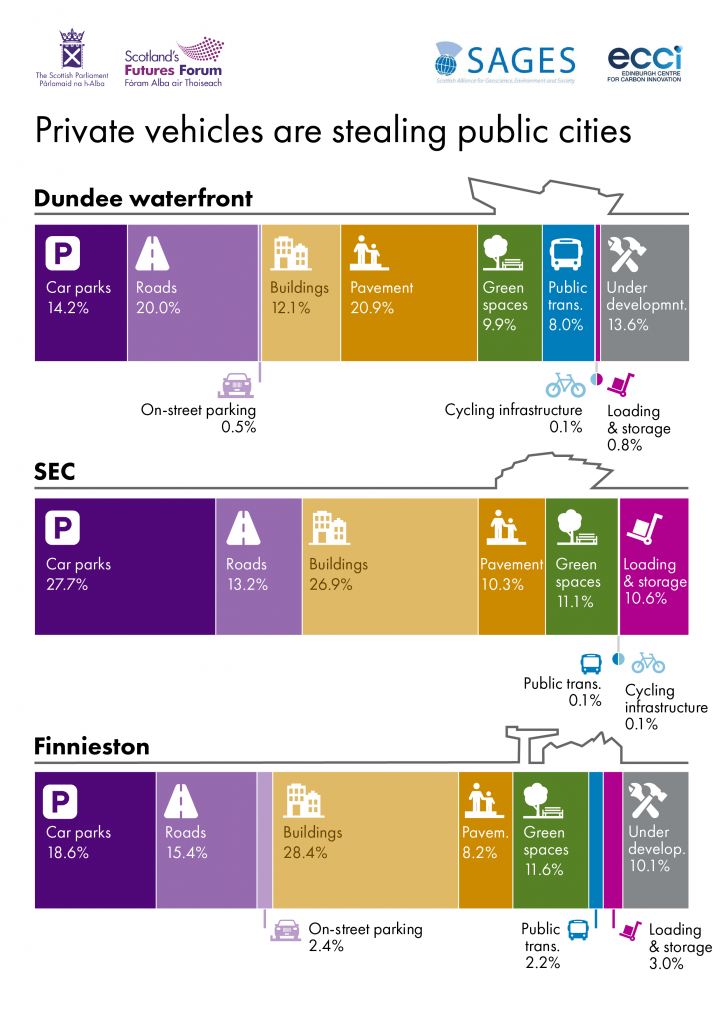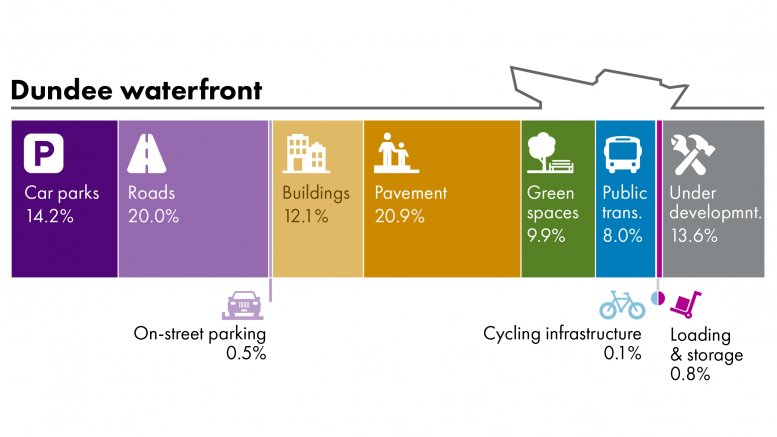The Scottish Parliament’s think tank, Scotland’s Futures Forum, has today published analysis which shows the large amount of space private cars take up in Scotland’s cities.
The aim of the project was to look creatively at the role of transport in climate change by assessing how much space is dedicated to private vehicles in comparison to other modes of transport in Scottish cities.
Using three case studies in Glasgow and Dundee, the study shows that space is overwhelmingly dedicated to the car: roads, car parks and on-street parking cumulatively account for the highest proportion of space at each site. Across each case study, space dedicated to cars ranged between 34.5% and 41%.
Furthermore, the analysis showed that green spaces, public transport and cycling infrastructure are extremely lacking and appear to be of relatively low priority. This is particularly apparent at the future COP26 venue, the Scottish Events Campus (SEC) in Glasgow, where more space is dedicated to outdoor smoking than bike parking.
At the future COP26 venue, the Scottish Events Campus (SEC) in Glasgow, more space is dedicated to outdoor smoking than bike parking.
The research was conducted by Marli de Jongh, a PhD student at the University of Glasgow. It was funded by SAGES – an alliance of Scottish universities and the British Geological Society – and supported by the Edinburgh Centre for Carbon Innovation.
Futures Forum Director Claudia Beamish MSP said:
“Stealing our Cities’ really gets us thinking about what sort of spaces and places we want to live in and welcome visitors to.
“The research shows a depressing dependency on the private car at the sites analysed. The recommendations, if acted on widely would make for a much more pleasant city experience with more green space, easier and safer walking and cycling opportunities.
“As a long-time Director of the Scottish Futures Forum, our Scottish Parliament think tank, I commend this project and hope it will set many minds thinking.”
Presiding Officer Ken Macintosh MSP, chair of the Futures Forum’s board of directors, added:
“The Future Forum seeks to bring fresh perspectives to our political thinking and how we prepare for the future. This analysis, which encourages us to look afresh at how our cities are designed, is a great example of that work
“All parties in the Scottish Parliament are committed to tackling climate change. With transport accounting for over a third of emissions in Scotland, this analysis encourages us all to consider how the status quo can be changed to do that.”

Background
Scotland’s Futures Forum is the Scottish Parliament’s futures think-tank. It works on a non-party basis to promote research and to stimulate debate on the long-term challenges and opportunities that Scotland faces. It aims to inform MSPs and others and enable them to consider the effects of decisions taken today on Scotland’s long-term future.
Looking beyond the five-year electoral cycle and away from party politics, the Futures Forum seeks to bring fresh perspectives, ideas and creativity on how we might prepare now for the future. It hosts discussions and seminars and presents ideas to engage Scotland’s parliamentarians and challenge their thinking.
Its work is governed by a board of directors, chaired by the Parliament’s Presiding Officer and including both MSPs and non-MSPs.
The published analysis can be found on the Futures Forum’s website here:
Research partners



